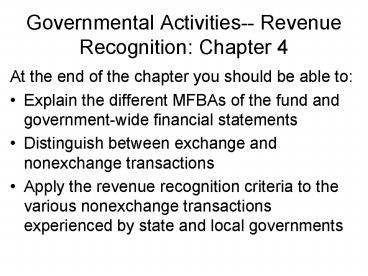Governmental Activities Revenue Recognition: Chapter 4 - PowerPoint PPT Presentation
1 / 23
Title:
Governmental Activities Revenue Recognition: Chapter 4
Description:
Property Taxes (ad valorem) Record gross amount of levy as receivable ... April 1, City levies ad valorem tax of $20,000 for the current fiscal year ... – PowerPoint PPT presentation
Number of Views:90
Avg rating:3.0/5.0
Title: Governmental Activities Revenue Recognition: Chapter 4
1
Governmental Activities-- Revenue Recognition
Chapter 4
- At the end of the chapter you should be able to
- Explain the different MFBAs of the fund and
government-wide financial statements - Distinguish between exchange and nonexchange
transactions - Apply the revenue recognition criteria to the
various nonexchange transactions experienced by
state and local governments
2
Review Governmental Funds MFBA
- Measurement Focus flow of current financial
resources versus economic resources - Basis of Accounting modified accrual versus full
accrual - Why? To help demonstrate whether the entity
obtained and used its resources in accordance
with its legally adopted budget - Providing information about interperiod equity is
the job of the full accrual government-wide
financial statements
3
Modified AccrualRevenue Recognition
- Governmental funds use modified accrual
accounting - Revenues are recognized when both
- measurable
- available
4
GASB 33
- Revenue recognition guidance for nonexchange
revenues - Imposed nonexchange revenues
- Derived tax revenues
- Government-mandated nonexchange revenues
- Voluntary nonexchange revenues
- Time requirements are eligibility criteria
- Purpose restrictions are constraints on use
5
Property Taxes (ad valorem)
- Record gross amount of levy as receivable
- Estimate uncollectible amounts and deduct from
revenue to recognize net amount - Defer any revenue that is not available
- Example
- April 1, City levies ad valorem tax of 20,000
for the current fiscal year - 5 estimate of uncollectibility
- Half due June 1, remainder due Sept 15
- Fiscal year-end is June 30
6
Property Tax Journal Entries
- Record levy in General Fund on 4/1
- Record levy at GW on 4/1
7
Collection of Taxes
- April collections in GF
- September collections in GF
8
Delinquencies and Write-Offs
- Delinquent taxes should be moved to another
receivable account on the substantive due date. - Direct write-off method is not GAAP
9
Other Imposed Nonexchange Revenues
- Fines, penalties, etc
- Recognize asset if you have an enforceable legal
claim - In the funds, recognize revenue if you have an
enforceable legal claim AND the revenue is
measurable and available - What if the fine can be contested?
10
Fines Imposed Nonexchange Revenue
- Enforceable legal claim
- Must be protested by a specific date
- If protested, the claim is not established and
the receivable should NOT be recognized - Measurable
- Historical experience is reliable for estimating
uncollectible amounts - Available
- Amounts that will not be collected within a
reasonable time after fiscal year end should be
deferred
11
Derived Taxes
- Recognize assets when the underlying transaction
occurs - In the governmental funds, recognize revenues at
the same time unless collection will be delayed
too long beyond fiscal year end to be considered
available
12
Grants and Other
- Sources of grants
- Revenue recognition
- Eligibility requirements
- Example Private 100,000 grant awarded on
9/15/2005 to purchase playground equipment for
city parks. 90,000 is spent on equipment in
December
13
Grant Example A
- Assume there are no eligibility requirements
- Playground Special Revenue Fund
14
Grant Example A contd
- Playground Special Revenue Fund
15
Grant Example B
- Assume funds are required to be spent in 2006
- Playground Special Revenue Fund
16
Grant Example C
- Assume the grant is reimbursement-based
- Playground Special Revenue Fund
- No journal entries until
17
Grant Example D
- Assume the City receives the cash at the time the
grant is awarded. The funds are to be spent on
playground equipment if the City can obtain
matching funds from another source - Playground Special Revenue Fund
18
Grant Example D contd
19
Pass-through Grants
- Is there administrative responsibility?
- No? Agency fund
- Yes? Recognize revenue and expenditure/expense in
the funds - Food Stamp program
20
Sale of Capital Assets
- In a governmental fund
- At the government-wide level
21
Investments
- Report at fair value all investments except those
with short-term maturities - All changes in fair value are reported on the
fund operating statement and the government-wide
Statement of Activities - Change in fair value Outputs Inputs
- Outputs FV at year-end sales
- Inputs FV at beginning purchases
22
Exchange Transactions
- Does a government have exchange transactions?
- How should they be recognized?
- GASB 33 prescribes that even transactions that
are not pure exchange transactions should be
accounted as such - The spirit of GASB 34 would indicate accrual
- However, the GASB also recognizes that
miscellaneous revenues are often best recognized
when received - Inconsistent? Practice is cash basis
23
Revenues
- General Fund
- Revenues by source
- Government-wide
- Charges for services
- Program-specific operating grants and
contributions - Program-specific capital grants
- General revenues

